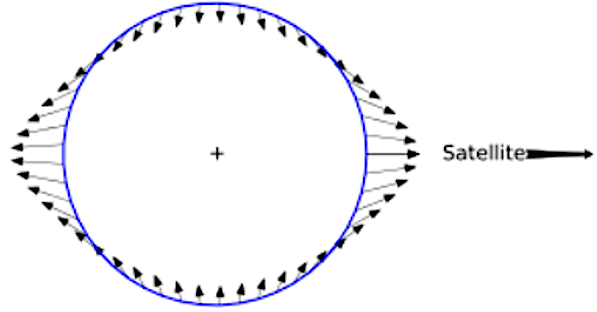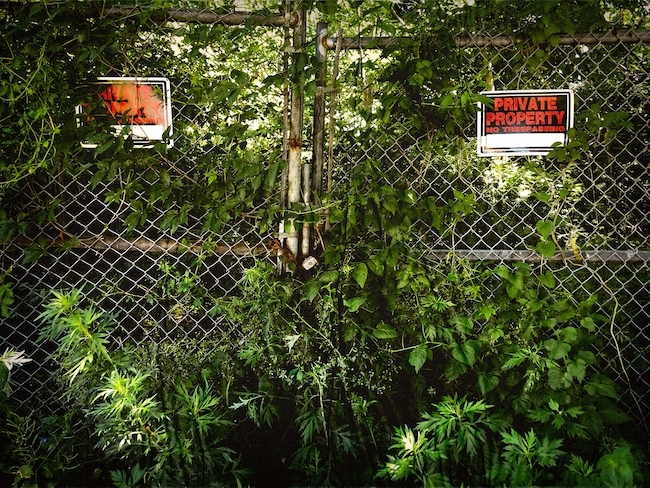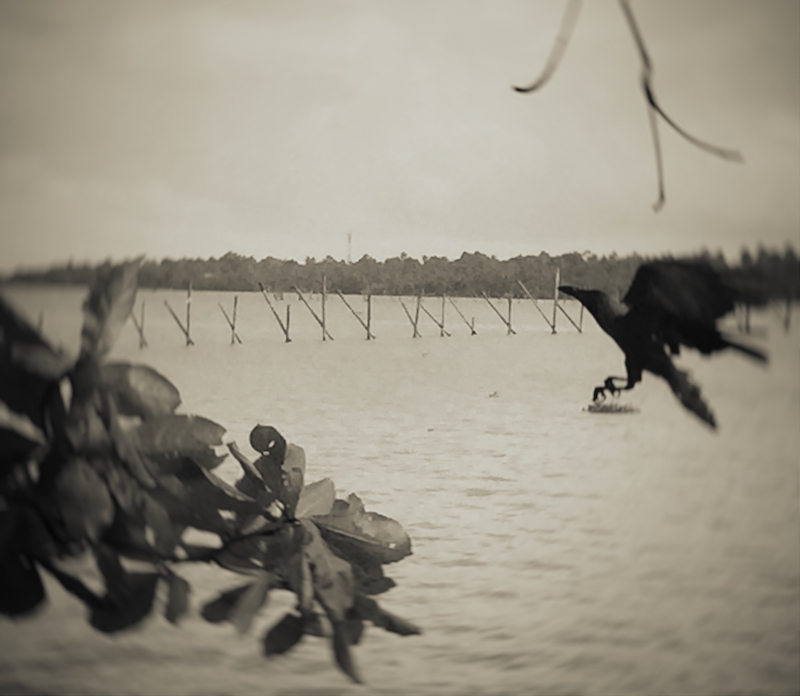New Year’s Day
Helena Rho
Staring at the peeling floral wallpaper in my dimly lit kitchen, I feel the first regret of the New Year. It is noon, January 1, 2003. I am hosting a Korean New Year’s banquet, and my sisters and their families will be here in an hour. I wonder why I chose to do this: this meal, this year.
I walk across the white and navy blue ceramic tile floor, chipped in so many places that I lament, yet again, the fact that I haven’t replaced it. I swing open a creaky cabinet door and extract the largest pot I own. As I fill it with water, I stare with dismay at the stained enamel sink, no longer a pristine white. I switch on the bulb above the grimy, formerly white range stuck in an awkward corner of the kitchen. The light flickers. I hold my breath. The weak, yellowing halo stays on.
Although we have spoken for many years about gathering for a traditional Korean New Year’s celebration, this year will be the first. If we had a brother, the jangsohn, we would be going to his house because it would fall to his wife to cook and host the meal. Instead, my sisters and I remain in the shadow of the missing son. My sisters and I all live in the metropolitan New York area. But, in two months, I am following my husband to Pittsburgh, to advance his career.
Still, I regret the invitation I impulsively extended to my sisters when I saw them over the Christmas holidays. Christmas matters because of our acquired families, our children. But for my sisters and me, it is Seollal or New Year Day’s that has resonance. When we lived in Korea, we celebrated Seollal on the first day of the lunar calendar, like millions of Koreans on the peninsula. But now, like other Koreans in the diaspora, away from our homeland, we celebrate Seollal on the first day of the solar calendar.
I have already made pots of steamed white rice and mounds of jhap chae—clear vermicelli noodles sautéed with beef, mushrooms, onions, carrots, spinach—and small, assorted side dishes called banchan. I have also cheated and catered gimbap, Korean cooked sushi rolls, and mandu teugim, fried pork dumplings. But I haven’t started on the tteok guk, rice cake soup.
Tteok guk is the soul of Seollal. And there is an art to cooking tteok guk. A deceptively simple dish, to get it right one has to be vigilant and patient. Tteok or rice cake, the heart of the soup, is capricious. Cook the sliced white ovals too long and they turn to mush, cook them too briefly and they retain the consistency of rocks. The list of ingredients is spare: beef broth, rice cake, eggs, scallion, sesame seeds. But it is the proportion of each component in relationship to the others that is important. And the order, in which the five elements are combined, is crucial to the taste.
Start with the broth, and then slide in slivers of rice cake. Eggs, whisked with a little salt, have to be stirred in before the scallions, or else the eggs clump around the minced green onions, creating chunks, not wisps. Crushed sesame seeds go in last, otherwise the soup tastes burnt. Sometimes, mandu or meat dumplings can be added. But that changes the soup, and then it’s called tteok mandu guk—rice cake and dumpling soup. My sister Sophia prefers tteok mandu guk. But not me. I am a purist at heart. Any other time of year I will eat tteok mandu guk gladly, but not New Year’s Day. Because Seollal is always about tteok guk.
When my sisters and I were growing up, whether it was in Kampala or Petersburg or New Jersey, my mother made rice cake soup every New Year’s Day. My mother used to say: “You can’t grow another year older and wiser if you don’t eat tteok guk on Seollal.” New Year’s Day, not New Year’s Eve, is the time of celebration for Koreans. It is our Thanksgiving. We reunite with family members and feast on an elaborate meal, prepared by the host family. There is no such thing as a potluck dinner for Koreans. Guests are not expected to bring anything other than the honor of their presence. After every grandmother, uncle, older sister, and youngest cousin have gorged themselves on the plethora of flavorful dishes, the children perform a time-honored tradition called sebae, in front of each adult. Boys bow, girls curtsey. And the children must recite a specific phrase: “In the New Year, may you receive much good fortune.” In exchange for these symbolic gestures of good will, the children are rewarded with cash. When we were young, my sisters and I competed to see who could win the most money.
In my kitchen, the maple cutting board clatters on the warped and slanted counter as I slice beef into slender two-inch strips to make broth. Blood oozes along the grain of cut wood and drips onto blue-speckled Formica. I think: I should have bought three pounds of beef, instead of two.
My sisters are petite women: none of them crest the five foot barrier. In pictures of the four of us, at five foot two inches, I am the bump that breaks the straight line. But their husbands are all tall, and my oldest sister’s husband is a big man. Susan, already twenty pounds past her ideal body weight, tries to keep up with her husband in the amount of food consumed. As though eating were a competition. Their only son at age three can eat at a pace which will no doubt match his father’s very soon. Rather than being disturbed by this potential problem, Susan is proud of her son. As a pediatrician, I feel duty bound to warn her against what I believe is permissive parenting. But despite my supposed expertise in childrearing, Susan dismisses me. She tells me that unconditional love is good for a child. She says she wishes she got even a drop from our mother. Susan is a clinical psychologist, who now devotes her life to her son and has not worked outside of the home since his birth.
I sigh and press my lips into a thin line, as the stainless steel pot squeaks on the uneven surface of the old, outdated cooking range. Dense constellations of bubbles erupt on the surface of the water. Steam rises and soon obscures the faded blue flowers on the worn wallpaper, coming undone at the seams.
My sister Sophia, older than me by two years, has no patience for Susan’s parenting. She tells her seven-year-old daughter and four-year-old son that she runs a boot camp. Sophia is all about scheduling. She is so organized and determined that she involves both her children in a frenzy of activity, six out of the seven days of the week. They race from school to the ice-skating rink, to piano lessons, to soccer games. I tell her to slow down or she will run herself and her children ragged. But she quotes from the Bible instead: “Idle hands are the devil’s workshop.” Sophia has rheumatoid arthritis, but works full-time as a pharmacist, volunteers in her children’s classrooms, and flatly refuses to stop the frenetic pace of her life.
I drop shreds of beef into scalding water and add dashida seasoning. I swirl the stew meat around. Clear water clouds into broth. I worry: Will there be enough?
My younger sister, Clara, doesn’t understand any of our arguments. She and her fiancé live in Manhattan, work miserable hours as attorneys, and get take-out most nights, unless they actually go out to a restaurant. Clara is childless and not about to change that any time soon. I tell her that thirty-three is not so young, but she rolls her eyes and tells me that she has plenty of time to have children. Someday. She disdains the advice of a sister, older than her by five years, as out of touch: “Why should I have children?” Probably a legacy of being raised by our mother.
Paralyzed by anger and guilt, my sisters and I avoid the subject of our mother. We cannot all agree on how to deal with her willful isolation and increasingly erratic behavior, and it is easier not to argue. But we are united in our failure. We all married non-Korean men, a moral crime in my mother’s eyes. Even Susan’s husband, the Chinese man among the white brothers-in-law, is not good enough. Two of the brothers-in-law are physicians and one-yet-to-be is a lawyer, professions my mother considers successful. But that is still not good enough.
My mother remained so opposed to this notion of tainting thousands of years of pure Korean blood that she did not attend Susan’s wedding. The first wedding among the four sisters. Although she was present at my nuptials, she came only grudgingly. I remember pleading with her while her face remained unmoved, as smooth as alabaster. “How could you do this to me?” she said. It was the first time in my life I disobeyed my mother’s wishes. She did not attend the Rehearsal Dinner, the night before my wedding, and until I saw her seated in the front pew of the poorly lit St. Catherine’s Catholic Church, I did not know she would come. Of course, I could not know the price I would pay in marrying an emotionally and physically abusive man.
Susan bitterly points out that our mother is too much of a snob to have missed my wedding—who would take the credit for me becoming a doctor and then crowning my achievement by marrying another? Certainly not my father, another failure in my mother’s eyes, and not just because they are divorced. To say that divorce is rare in Korea is an understatement. Koreans do not get divorced, especially those in the upper class like my parents. My mother still hasn’t told her family fourteen years after her divorce, and she probably never will. Because of her overwhelming sense of shame, a character trait I inherited. She rarely visits Korea, and her mother and sister last visited when I was a child. She no longer speaks to her family on the telephone. The last time she got a phone call, it was news that her father had died. So she writes letters, blue folded notes with “aerogram” printed on them. I imagine she can create a parallel universe on those thin azure sheets: one in which she is happy, one in which her family does not have to worry about her.
In the tight confines of my dreary kitchen, the fragrance of meat rising in temperature fills the air. The blade of my knife falls across the bodies of the scallions, releasing a bitter yet refreshing scent. I finish the rest of my mis-en-place: prying apart oval slices of rice cake, resisting the starch sticking them together like glue; cracking open large brown eggs into a white bowl and whisking them with a little salt; grinding sesame seeds in the ceramic mortar and pestle. The nutty, nostalgic aroma of crushed seeds bathes my nostrils, reminding me of all the meals my mother cooked during my childhood.
Until my children were born, I did not know how to make tteok guk. Growing up, my mother shooed me away from the kitchen whenever I asked to help. She would say, “You need to study. You are going to do important things when you are a doctor. Cooking is easy. I can teach you that later.” Except later never came. To learn how to cook Korean food, I bought a cookbook written in English by a Korean-American, who interspersed her mother’s recipes with personal family stories—about her grandmother, a renowned chef, in what is now North Korea, and her mother, the primary bread earner, struggling to start a restaurant in the East Village in New York. Estranged from my mother, I can’t call her to ask if she uses more soy sauce and less sugar in her bulgogi than the author suggests. Or if she adds more scallions and fewer sesame seeds to her tteok guk. I have to rely on my memories of tasting her soup. With the guide of a cookbook, I am trying to recreate my mother’s tteok guk.
Like a cyclone of motion, my six-year-old daughter bursts into the cramped kitchen. “Mommy, Mommy, you have to help me!” She careens around, making miniature circles on the ceramic tile floor.
“Erin, please, stop the noise.”
She fights to contain her energy, but her arms flail with each word. “I need your help putting on my Korean princess costume!”
“Do you have to wear that today?” I am referring to the Korean hanbok or traditional dress worn by women in Korea for special occasions. I had bought a miniature, pink and white one, fashioned like a Joseon Dynasty princess, for my daughter as a Halloween costume.
“Yes, yes, yes!” Her eyes are wide, her head nodding vigorously. “I’ll get more money if I’m dressed like a Korean!”
“I don’t think your cousins are coming dressed in hanboks. Can’t you just put on your regular clothes?” I try to reason with her.
“No!” She is impatient with my lack of understanding. “Mommy, please, let me wear it!”
I am defeated. “Okay, okay. Just bring it down. I will help you.”
She thunders upstairs, her shout of thanks echoing in the stairwell.
I remember dressing up in my mother’s hanboks as a child on New Year’s Day, to do my sebae with my sisters. I can’t blame my daughter for wanting to do the same.
“Why didn’t you start the tteok guk sooner?” Sophia asks the moment she steps into my kitchen.
My sisters have arrived in a flurry of noise and activity, one after another. Their children play with mine downstairs in the family room while they set two tables—putting out the fine bone china, glasses, silver chopsticks for the adults’ table and the paper bowls, plastic cups, and wood chopsticks for the children’s table. I hear snatches of my sisters’ chatter and laughter. One of them scolds a child not to run in the living room. One of them tells me that the fried pork dumplings are delicious, while another sister wanders into the kitchen, chewing on seaweed-covered gimbap filled with rice, beef, spinach, daikon, egg, and carrots.
I dip my Korean spoon into simmering soup and take a cautious taste. The beef broth has infused heartiness into the rice cake ovals; the scallions are bright and tangy; the eggs are light and delicate; the crushed sesame seeds have been absorbed into nuttiness. And the slices of rice cake are soft, but structured. All five ingredients have melded, and harmony has emerged. I ladle the soup into round celadon bowls. We sit down to eat.
“Next year we should have it in my house. My kitchen is bigger. And it will be renovated,” Sophia says.
I nod.
“Why didn’t you put mandu in the tteok guk? You know, it would taste better that way,” Sophia says, wanting her dumplings.
“Because I didn’t want to,” I snap. Immediately, I regret my curtness. The new year will not bode well if we start with a fight. “Tteok guk is what we always have on New Year’s Day,” I amend, passing out gim—roasted and salted seaweed squares—to crumble into the soup.
“It’s boring. It would taste better with mandu,” Sophia insists.
“Tteok guk is comfort food.” I bite on a sliver of rice cake, savoring the firm yet yielding center and the play of flavors and textures—so simple, yet so complex.
Sophia shrugs. “Whatever.”
She will never understand my love of tteok guk.
Immediately after the meal, our children clamor to do their sebae. We decide that each adult couple will take turns sitting on the sofa while all the children bow and curtsey together. That way, the children will prostrate themselves four times, instead of eight. Sophia and Clara give one dollar to each child. I do the same. But not Susan. She distributes twenty-dollar bills in shiny red envelopes. The children shriek with delight at their windfall. When the adults look at her askance, she says that it will be Chinese New Year in a matter of weeks, and we should celebrate that, too.
Clara, characteristically quiet through most of the chaos, approaches me with her coat draped over her arm. She intends to go into the office, billing more hours even on this holiday.
“Why don’t you stay for coffee?” I say, hoping to extend her visit.
She brushes me off, as expected. “I can’t. I’m going to trial next week.”
I am resigned. “It’s good to see you. Let’s get together for dinner in the city before I move.”
She shakes her head. “I don’t know how long the trial will be.”
We still have time. You can’t squeeze me in? Instead, I just nod.
But Clara hesitates in her haste to leave my house. She slowly pulls on her coat, adjusts her scarf, carefully inserts each finger into her gloves.
I wait.
“I got a letter from Mom,” she says, her words rushed.
I close my eyes and hold my breath. When I open my eyes, I see Clara staring at the broken tiles in my kitchen floor.
“What does she want?” I ask.
“She needs money.”
“What else is new?” I say.
“She’s getting worse. She used to ask for a couple of hundred dollars every few months, and I would just send a check. But this time, she wrote me some story about an emerald that is worth $30,000. But she will sell it to me for $20,000.”
Clara speaks softly to try to hide the fact that she is crying, but her tears fall faster. I try to put my arm around her shoulder, but she rebuffs me. I understand. Sometimes, one touch and I come unraveled.
“It’s not your fault. You know she tried that with me. When I told her I couldn’t buy the emerald, she stopped speaking to me. She moved on to Sophia then Susan and now you,” I say.
“What do I write back? I know she needs money, but $20,000! If she needs that kind of money, she needs to sell her house.” Clara is literally wringing her hands.
“The roof is falling in. But she clings to that house. Insisting it will be worth a million dollars in a few years. How do you reason with a delusional woman?” I say, rehashing old ground.
“If only we could get her out of that house!” Clara twists her scarf into a knot.
“We tried. We can’t,” I say softly.
Silence and failure hang between us.
Clara wipes away her tears, her mask back in place. “I have to go. I’ll call you about dinner.” She slips on her shoes and steps out the door.
I lean the weight of my body against the worn floral wallpaper of the kitchen, rest my head on the wall. I want to close my eyes and go to sleep. Instead, I take a deep breath. I go back to the party.
My children and their cousins are running around my living room, shouting with joy, dropping crumbs carelessly. I do not curb their enthusiasm.
“I guess they’re having a good time. But they’re making too much noise.” Sophia says, as she tries to rein in her children, with no success.
“Leave them alone. You’re too uptight,” Susan says.
“No, Sue, just because your kid is out of control doesn’t mean my kids should be too. My children know what is expected of them,” Sophia says, as she pointedly stares at Susan.
“Okay, you guys, no fighting,” I interrupt before things escalate.
Susan and Sophia live in the same development of cookie-cutter houses, only blocks apart. They rely on each other to pick up their kids from school, car pool to activities, and trade babysitting. Most of the time it works. But they clash in their methods of discipline, and their children play together often. I frequently get complaints from one about the other, especially in the aftermath of a battle. Like our mother, they haven’t made close friends, maybe because they have each other and perhaps feel they don’t need others.
“Do you remember the last New Year’s we spent in Korea?” Susan suddenly asks, her voice wistful. “It was the last time we saw our cousins.”
Her yearning is too much to bear. I look away.
On Seollal, 1972, my parents, sisters, and I lived in Seoul. We took a taxi to a relative’s house in the suburbs of the city. I can’t remember which one. I think it must have been someone on my mother’s side of the family, but I could be mistaken since my father’s family is from Seoul and my mother’s family is from Gwangju. By the time we arrived, groups of people occupied every room. My sisters and I went to play with other children, plotting ways to get more money from the adults when time came for the bows and curtseys. We were allowed to eat everywhere and run while doing it, something quite unusual in our everyday lives. I remember a whirlwind of sound—adults laughing, children yelling, music playing. I remember my mother happy. At the end of the night, I was the child who made the most money. I paid for our taxi ride home. I was proud of my accomplishment. I couldn’t stop smiling as I sat, among my sisters, looking out at the lights illuminating Seoul. I thought: what a wonderful end to the first day of the new year.
After my sisters go home, I am left with the remnants of tteok guk. The broth has congealed from the starch of rice cake ovals, which are now bloated and misshapen. Beef strips, shriveled and discolored, stick out of the soup like brown twigs. Dried, yellow egg tendrils cling to the sides of the stainless steel pot. I pick up the dirty dishes from the dining room table and take them into my woeful kitchen. The peeling wallpaper, the mismatched melamine cabinets, the stained sink are thrown into sharp relief by the dismal lighting.
I tell myself that I am glad I saw my sisters before I go through yet another disorienting shift in geography. But I have to stop myself from dropping to my knees on that broken tile floor. I want to mourn the girls that my sisters and I used to be. I want to mourn the woman my mother was. But I do not cry. Instead, I wash the plates, the pots, the chopsticks. I erase the detritus of a misguided meal.
An opportunity was lost that New Year’s Day. I still go over the events of that day and wonder what I could have done differently. How I could have convinced my sister Clara to stay for coffee. How I could have persuaded my sisters to sit down and talk about our mother, to find ways to show her kindness and preserve her pride. So she wouldn’t feel shame in asking her daughters for help.
I wonder if I could have changed what happened the following year. I wonder if I could have stopped my mother from trying to commit suicide.
Helena Rho, a former assistant professor of pediatrics, has practiced and taught at the Children’s Hospital of Philadelphia, the Johns Hopkins Hospital, and the Children’s Hospital of Pittsburgh. Her work has appeared in Creative Nonfiction, Slate, Crab Orchard Review, Entropy, and Fourth Genre, among others. “New Year’s Day” is part of her memoir-in-essays, American Seoul.





